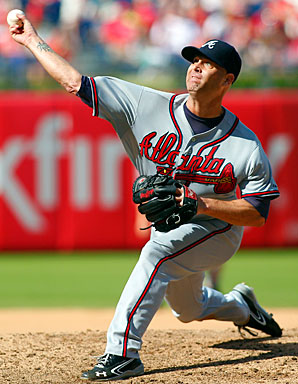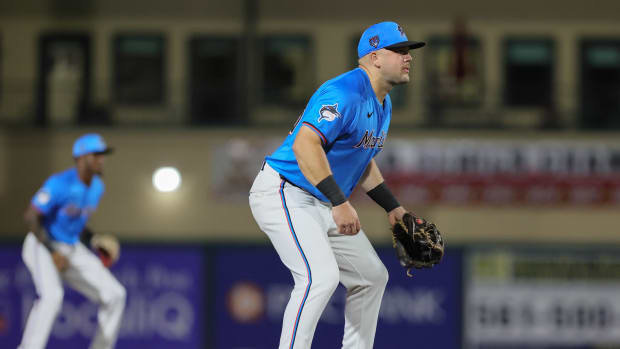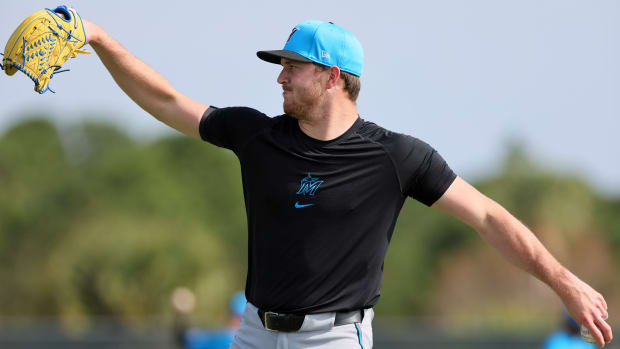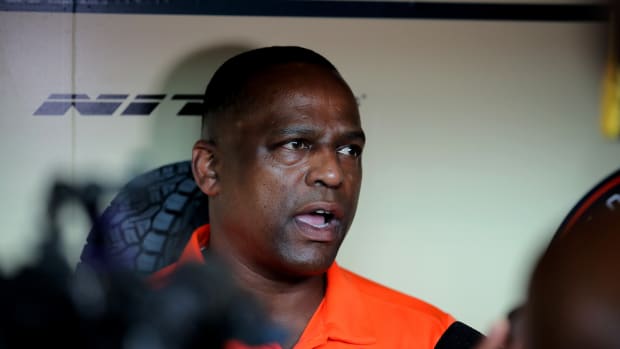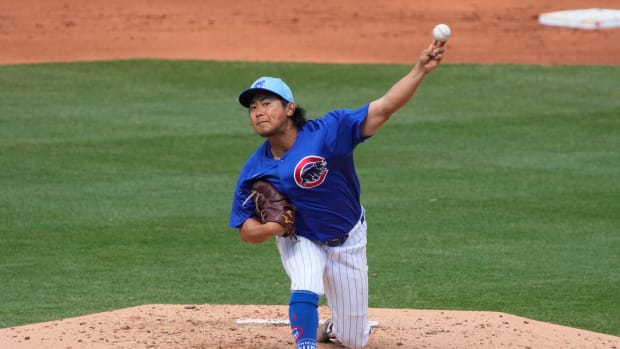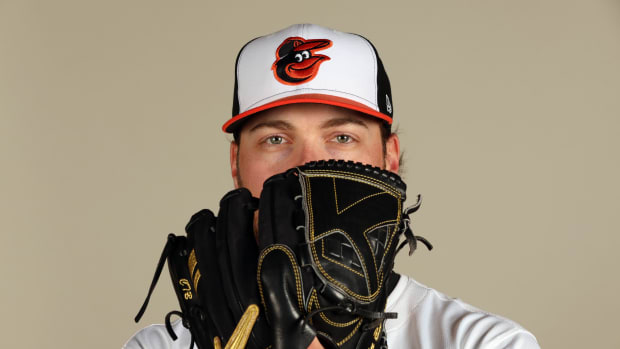Hudson's 200th win praiseworthy but Hall of Fame not in his future
Tim Hudson reached a major milestone on Tuesday night. (Kevin C. Cox/Getty Images)
Tuesday night was a banner one for Tim Hudson. The 37-year-old Braves righty held the Nationals to one run over seven innings, and contributed to an eight-run onslaught by belting a solo home run off Zach Duke once his teammates had chased starter Gio Gonzalez. That combination was more than enough to net Hudson the 200th win of his career.
It's an impressive achievement, even if the sabermetric gospel preaches that pitcher wins aren't all they're cracked up to be, as they depend heavily on the offensive, defensive and bullpen support a pitcher receives from his teammates. On a daily or yearly level, win totals can be wildly misleading thanks to those factors well beyond a hurler's control, but it nonetheless takes a pretty good pitcher to stick around long enough to reach such a milestone. Consider that at the moment, just two other active pitchers have reached that plateau, and only one other is within range of reaching it this year:
Rank | Player | Wins | Years |
1 | 248 | 41 | |
2 | Roy Halladay | 201 | 36 |
3 | Tim Hudson | 200 | 37 |
4 | 195 | 32 | |
5 | Derek Lowe | 176 | 40 |
6 | 175 | 34 | |
7 | Bartolo Colon | 174 | 40 |
8 | Barry Zito | 163 | 35 |
9 | Freddy Garcia | 152 | 36 |
10 | 144 | 38 |
Even as he struggles to recover his lost velocity (not that the results have been awful), Sabathia is almost a lock to get to 200. Given that Buehrle is under contract through 2015, and is on a run of four straight years of 13 wins, he'll likely get there eventually. Zito, Hudson's former teammate in Oakland, theoretically has a chance, but he's averaged just under 10 wins a year in the first six years of his massive contract while pitching to a 91 ERA+, so he may need to stick around another few years to get there, and it's not clear his stuff is good enough.
Beyond that, it could be awhile before we see anyone get to 200. Consider the distance that top Cy Young candidates such as Cliff Lee (127 wins), Justin Verlander (127) and Felix Hernandez (100) who are on the sunnyside of 35, are from getting there. (I'll come back with a fuller examination of the 200 milestone this afternoon.)
Hudson, however, is going reasonably strong. In his three full seasons since returning from August 2008 Tommy John surgery, he has pitched to a 3.19 ERA (122 ERA+) while averaging 208 innings a year, and while he doesn't miss a ton of bats (5.8 strikeouts per nine), his high groundball rate and low walk and homer rates have led to one of the stronger stretches of his career. That said, last year featured his highest ERA and lowest strikeout rate since his elbow surgery (3.62 and 5.1 per nine, respectively), and a slow recovery from offseason back surgery cost him five weeks on the disabled list to start the year. His average fastball velocity slipped below 90 mph (to 89.6) for the first time, as he lost around one mile per hour for the second year in a row. Even at similar velocity this year, he's off to a solid start, with a 3.86 ERA and 6.2 strikeouts per nine, though he's already allowed five homers in 35 innings, compared to 12 all of last year.
By itself, 200 wins isn't enough to draw significant support in the Hall of Fame voting, and on the traditional merits, Hudson doesn't have a ton else to augment his case. He's been an All-Star three times, respectable but hardly exceptional. He's finished as high as second in the Cy Young voting (back in 2000, his first full season, when he won 20 games with a 4.14 ERA) and in the top four three times (2003 and 2010 being the others). He's led the league in a Triple Crown category just once (wins in 2000) and while he's pitched well in the postseason (3.46 ERA in 54 2/3 innings), he has just one win, and has never been on the winning side in six October series. That's not all his fault, but it won't help him stand out on a crowded ballot eight or 10 years from now.
It's worth noting, of course, that the Hall has inducted just one pitcher with less than 300 wins since Fergie Jenkins in 1992, that being Bert Blyleven (283 wins) in 2011, his 14th year of eligibility. More decorated pitchers with less than 300 wins have reached the ballot or will do so before Hudson arrives: Pedro Martinez, Mike Mussina, Curt Schilling and John Smoltz, perhaps even Halladay if he can't turn the corner. Martinez has the Cy Youngs and World Series rings, Mussina 270 wins and far more strikeouts, Schilling an amazing postseason track record to go with a ton of Ks, Smoltz a Cy Young, the Ks and a spot as a pillar of the Braves' dynasty. From a voter standpoint, Hudson's not at their level.
The JAWS system isn't particularly optimistic about Hudson's credentials, either. his 55.8 career Wins Above Replacement ranks 78th among starting pitchers, 0.4 ahead of the much younger Sabathia, but a bit behind non-Hall of Famers such as Dave Stieb and Orel Hershiser. Both of those pitchers had much higher seven-year peak WARs than Hudson's 38.4, which ranks just 104th, tied with Sabathia and Jim Kaat. That combination gives him a 4.7.1 JAWS, 86h among starters. He's well below the average Hall of Fame starter (72.6 career, 50.0 peak, 61.3 JAWS) in all three categories, but among good company in the neighborhood of his ranking:
Rank | Pitcher | years | Career | Peak | JAWS | Wins | ERA | ERA+ |
78 | Orel Hershiser | 1983-2000 | 56.8 | 40.4 | 48.6 | 204 | 3.48 | 112 |
79 | Frank Tanana | 1973-1993 | 57.9 | 38.5 | 48.2 | 240 | 3.66 | 106 |
80 | Tommy John | 1963-1989 | 62.0 | 34.4 | 48.2 | 288 | 3.34 | 111 |
81 | 2000-2012 | 51.4 | 44.8 | 48.1 | 139 | 3.20 | 136 | |
82 | Wilbur Wood | 1961-1978 | 50.2 | 45.8 | 48.0 | 164 | 3.24 | 114 |
83 | Wilbur Cooper | 1912-1926 | 53.7 | 41.4 | 47.6 | 216 | 2.89 | 116 |
84 | Sandy Koufax* | 1955-1966 | 49.0 | 46.1 | 47.5 | 165 | 2.76 | 131 |
85 | Burleigh Grimes* | 1916-1934 | 53.0 | 42.1 | 47.5 | 270 | 3.53 | 108 |
86 | Tim Hudson | 1999-2013 | 55.8 | 38.4 | 47.1 | 200 | 3.42 | 125 |
87 | CC Sabathia | 2001-2013 | 55.4 | 38.4 | 46.9 | 195 | 3.50 | 125 |
88 | Nap Rucker | 1907-1916 | 48.0 | 45.6 | 46.8 | 134 | 2.42 | 119 |
89 | Jack Powell | 1897-1912 | 56.8 | 36.8 | 46.8 | 245 | 2.97 | 106 |
90 | Andy Pettitte | 1995-2013 | 58.7 | 34.1 | 46.4 | 248 | 3.86 | 117 |
91 | Babe Adams | 1906-1926 | 52.0 | 40.4 | 46.2 | 194 | 2.76 | 118 |
92 | Dwight Gooden | 1984-2000 | 53.2 | 39.1 | 46.1 | 194 | 3.51 | 111 |
93 | Whitey Ford* | 1950-1967 | 57.4 | 34.7 | 46.0 | 236 | 2.75 | 133 |
Of the 15 pitchers around Hudson in that table, three are Hall of Famers: Koufax, who had a tremendously high peak, a lot of hardware and a big postseason impact; Grimes, who had a high peak and stuck around a long time thanks to his still-legal spitball; and Ford, who didn't have much of a peak but was a key part of a long-running Yankee dynasty, with an exceptional postseason career. Of the more contemporary quartet mentioned above, Martinez, Schilling and Mussina are well above the JAWS line and in the top 30 among starters, while Smoltz, who spent a few years as a closer, ranks 58th, still way above Hudson.
Hudson isn't done yet. On a Braves team that's off to a hot start, he's still got a shot at a World Series ring and and a more well-rounded posteason resume. On the other hand, he's in the final year of a four-year, $36 million contract, and while it sounds as though he plans to continue, he may have to leave Atlanta to do so. His push up the JAWS rankings won't be easy; the 3.4 WAR he has averaged during his post-surgical career masks a pattern of decline — 5.7 in 2010, 2.9 in 2011, 1.6 last year — that suggests he'll be hard-pressed to maintain that rate.






























